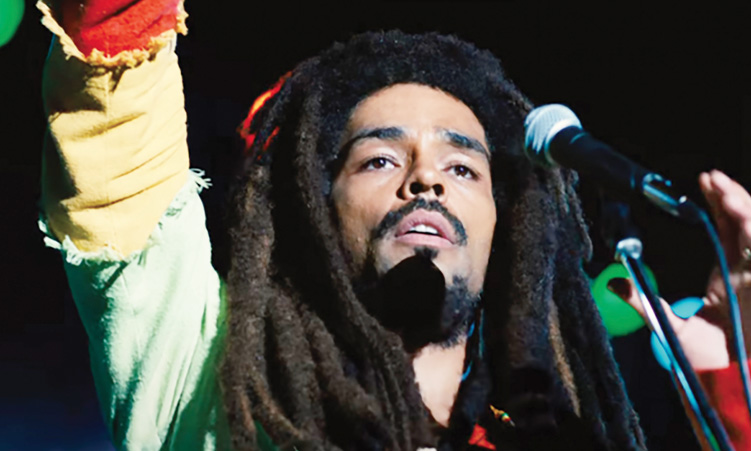The life and times of reggae superstar Bob Marley hit the big screen in a sanctifying and feel-good biopic directed by Reinaldo Marcus Green.
Simply titled ‘Bob Marley: One Love’ (2024) and presented almost entirely in the Jamaican language, the film begins shortly before the assassination attempt that prompted Marley’s move to Britain where he and the Wailers recorded their chart-topping album ‘Exodus’ (1977).
As biopics are rarely the full measure of a person’s life, ‘Bob Marley: One Love’ focuses on two pivotal years in the legend’s career, as well as two concerts that signal his wounded leaving and triumphant return to his homeland. Offering some insight into the political situation in Jamaica, Marley’s birthplace, the film finds the musician already a local star, but still subject to harassment due to his Rastafari religion, as well as the volatile political situation created by opposing leaders and rival gangs.
Produced by various members of the Marley family and starring a consummate Kingsley Ben-Adir as the icon, ‘Bob Marley: One Love’ celebrates Marley’s music in a film that showcases some of his greatest hits, while zooming in on his message of peace, unity and love.
The effect is one that paints Marley in warm, flattering tones which see him playing soccer, doting on his young children and, yes, jammin’ with his thinly sketched bandmates while only scratching at the surface of his personal plagues and demons.
Most apparent is his abandonment by his British father who is shown in flashbacks and dreamlike sequences as a stern, white figure on a horse.
Marley’s no doubt challenging relationship with his talented wife Rita, played by the magnetic Lashana Lynch, is another influential character in the singer’s life but her stoicism in the face of the star’s infidelity, extramarital children, all-encompassing musical mission and growing international fame doesn’t feel sufficiently explained or explored.
Embodying the most fleshed out characters, Ben-Adir and Lynch do a good job, but the film seems to steer around or rush through any real or sustained conflicts and struggles, while Marley’s musicality is presented as a series of epiphanies that spawned some of his greatest hits.
Telling in a scene in which Marley assaults his corrupt manager who is overcharging Africans for the musician’s dream of an African tour, the film does show glimpses of Marley’s complexity and not entirely non-violent nature, but largely leans into the idea of Marley as a sanitised prophet of peace.
While Marley can certainly be framed as such, there is much to be said for Marley the man that simply isn’t, despite some flashbacks to his childhood and dreamy scenes underscoring the Rastafari reverence of Ethiopian Emperor Haile Selassie whose ideals of African unity are echoed in Marley’s own oeuvre.
For those who only know Marley from such vibey songs as ‘One Love’ and ‘Jammin’ or as the red, green and yellow framed face on everything from lighters to reggae bars, this heartfelt, high-gloss, music-filled and ultimately irie cinematic tribute will help expand the life of the effortlessly cool icon.
– martha@namibian.com.na ; Martha Mukaiwa on Twitter and Instagram; marthamukaiwa.com
Stay informed with The Namibian – your source for credible journalism. Get in-depth reporting and opinions for
only N$85 a month. Invest in journalism, invest in democracy –
Subscribe Now!






